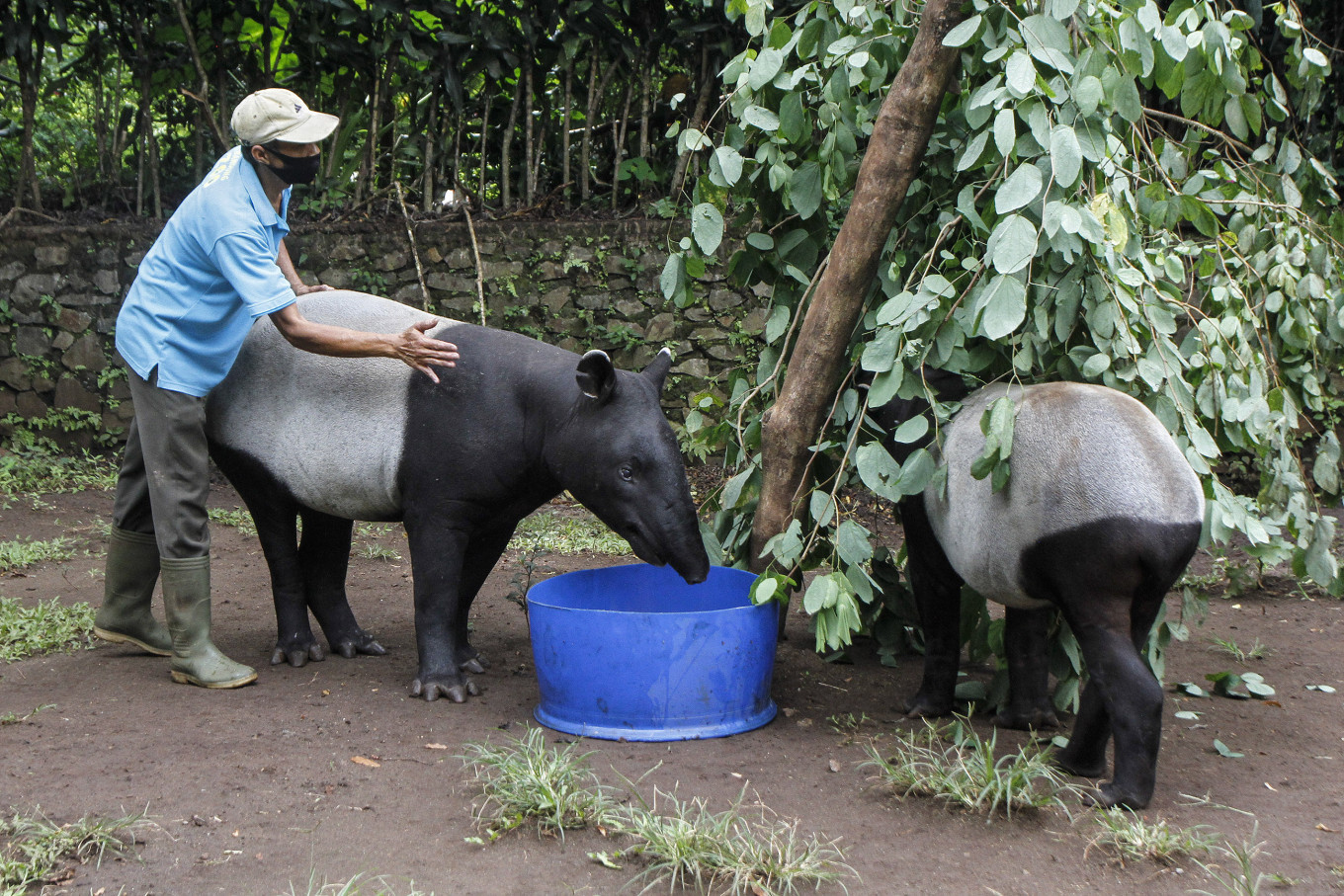Popular Reads
Top Results
Can't find what you're looking for?
View all search resultsPopular Reads
Top Results
Can't find what you're looking for?
View all search resultsSlaughtering zoo animals to feed other animals ‘last resort’ in hunger crisis
Change text size
Gift Premium Articles
to Anyone
I
n a worst-case scenario, it may be necessary to kill zoo animals to feed other animals to resolve a hunger crisis at zoos stemming from a lack of revenue from visitors during the COVID-19 pandemic, which has doomed thousands of animals in Indonesia, zoos and veterinarians have said.
Indonesian Zoo Association (PKBSI) head Rahmat Shah said earlier this week that zoos under his association had yet to slaughter any animals to feed its carnivores as of Tuesday. But he said the zoos would consider doing so in the next few months as a last resort if they were unable to survive the financial drought caused by COVID-19 and fail to receive help, noting that they would only sacrifice old and non-endangered animals.
He urged the government to pay more attention to zoos amid such difficulties, with the association receiving no clear response from authorities despite having sent official letters to them two weeks ago.
“We do not know when the coronavirus [outbreak] will end, whether it will be in a week or three months. But if this does not end in three months, we will be in big trouble,” he said. “It is already an SOS [situation].”
The association had raised Rp 500 million (US$33,028) as of Tuesday out of a targeted Rp 2 billion to help feed zoo animals. Several organizations have also stepped in to send vegetables and grass while some zoos have utilized their own feedlots and grown their own plants, Rahmat said.
Such efforts aim to prevent thousands of animals in Indonesia from starving as zoos have seen a steep revenue decline since the start of the outbreak. A PKBS survey conducted this month shows that 92 percent of the association’s members in Sumatra, Java, Bali, Lombok and Kalimatan – 55 zoos – had enough food to feed their animals until mid-May.
Read also: Indonesian zoos launch ‘Food for Animals’ fundraiser as pandemic devours revenue
Indonesia has the sixth-highest number of threatened species globally with 1,654 species on the International Union for Conservation of Nature (IUCN) red list. The zoos within the association house nearly 70,000 animals from 4,912 species endemic to Indonesia and those from other parts of the world.
“This is very alarming [...] We don’t want to see animals starve,” Jakarta Animal Aid Network (JAAN) cofounder Femke den Haas said on Tuesday.
“This is the time for us to fix everything,” she added, urging the government to be more proactive in improving, if not introducing, zoo contingency plans to prevent slaughters from even being an option.
Veterinarians Association of Indonesian Wildlife, Aquatic, and Exotic Animals (Asliqewan) board member Ridzki MF Binol said such slaughter would fall under population management standards and could be carried out as long as it adhered to animal welfare principles.
To qualify for slaughter, the animal has to be an overpopulated species, healthy and at its unproductive age. He advised trapping and slaughtering them in a way that causes the “least stress” and discouraged euthanizing animals through chemical injections, which could pose health risks to the carnivores that eat them.
“But sacrificing herbivores to feed the carnivores […] should be a last resort. We recommend the Environment and Forestry Ministry to have and immediately implement a mitigation plan during this emergency COVID-19 pandemic situation,” Ridzki said.
Global institutions have yet to form a consensus on similar cases but they previously provided guidelines on euthanasia. The World Association of Zoos and Aquariums (WAZA), for instance, wrote in a 2005 paper that “euthanasia can be another method of population control for some populations, but not all” and “should be considered only when all other possibilities have been reviewed”.
Read also: COVID-19 won’t stop Indonesia from conserving endangered wildlife treasures
In Indonesia, there are no rules regulating the slaughter of zoo animals to feed other animals during crises, the Environment and Forestry Ministry’s Natural Resources and Ecosystem Conservation Directorate General, Wiratno, said on Tuesday.
“Even if they find any legal basis [to justify the slaughter], [zoos] should get permission from me first,” he said.
But he said zoos should avoid such measures and urged them to communicate with the ministry for help before deciding whether to sacrifice animals. He said the ministry had a bailout fund from the state budget that was “large enough” to buy food and medication for zoo animals.
The ministry is waiting for responses to its letters sent out to several other ministries regarding tax relaxations for zoos. It is also waiting for a response to its letter to the Transportation Ministry on easing the transportation of animal food between cities amid large-scale social restrictions.
“So there is no need to worry,” Wiratno said.
Outside Indonesia, the Berlin Zoo in Berlin, Germany, plans to feed some of its animals to other animals in a worst-case scenario, as reported by German newspaper Die Welt and newswire DPA.
Editor’s note: This article has been updated to correct the name of Asliqewan in the 10th paragraph and the statement made by Ridzki MF Binol in the 12th paragraph.










